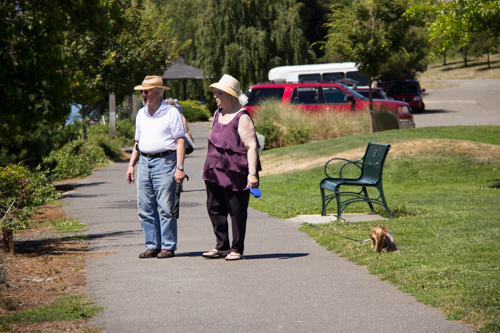
Senior Skincare In The Summer
We love being out in the sun! Not only do we get our vitamin D fix, but we also enjoy the warmth and the general happy feeling associated with a warm, sunny day. As the general rule goes, too much of a good thing is bad, so is too much of the sun on our aging skin. Especially, exposure to ultraviolet rays is bad on our aging skins. Those ultraviolet (UV) rays not only cause sunspots and wrinkles but is the leading cause of skin cancer.
According to Everyday Health, as we age our skin becomes thinner and begins to become unable to restore itself making seniors more vulnerable to these problems. It becomes more important to protect from UV rays, especially in the summer when the sun is the strongest.
While there are many steps that can be taken for healthier skin, here are 5 action items that seniors can take to protect their skin in the warm summer months:
Stay hydrated
Seniors are more susceptive to dehydration than those of a younger age because they are less aware of their thirst and lose their ability to conserve water. “Dehydration makes your skin look more dry and wrinkled which can be improved with proper hydration” according to dermatologist Kenneth Ellner, MD.
Apply sunscreen regularly
The Skin Care Foundation has advised applying sunscreen that's 15 SPF or higher before leaving home and a sun block that's at least 30 SPF prior to participating in outdoor activities. Applying sunscreen once won't be enough to guard the skin from UV damage - seniors should reapply every two hours when they're in the sun for long periods and after exposure to water from swimming or extensive sweating.
Moisturize
Skin is particularly prone to dryness during old age. Hot temperatures and sun damage make this worse. Applying moisturizer prevents water loss from the skin layers.
Choose shade
If you want or need to be out in the direct sunlight try to limit your time to early morning or late afternoon. The sun is the strongest between 10 am and 4 pm and should be avoided during this time if possible. Accessories like sunglasses, umbrellas, and hats will help protect the skin.
Check medication warnings
Adults taking prescription medications should regularly check the labels for information about how their medicine may affect their bodies in sun exposure. Some medications may recommend staying out of the sun. Older adults who are unsure can ask their doctor for advice.
Why is skin health important? https://www.sharecare.com/health/healthy-skin/why-is-skin-health-important Honor Society of Nursing (STTI) answered: “Your skin health is important not only for your appearance, but more importantly because your skin performs so many essential tasks for your body. Your skin protects your body from the many viruses and bacteria you are exposed to daily. It also protects you from the sun's rays - specifically ultraviolet light - that can damage cells. Healthy skin produces vitamin D when exposed to the sun, and vitamin D is important for many body functions. Having healthy skin also helps your body keep its temperature at a constant level. Healthy skin also helps you react better to important changes around you by feeling pain or pressure.”
